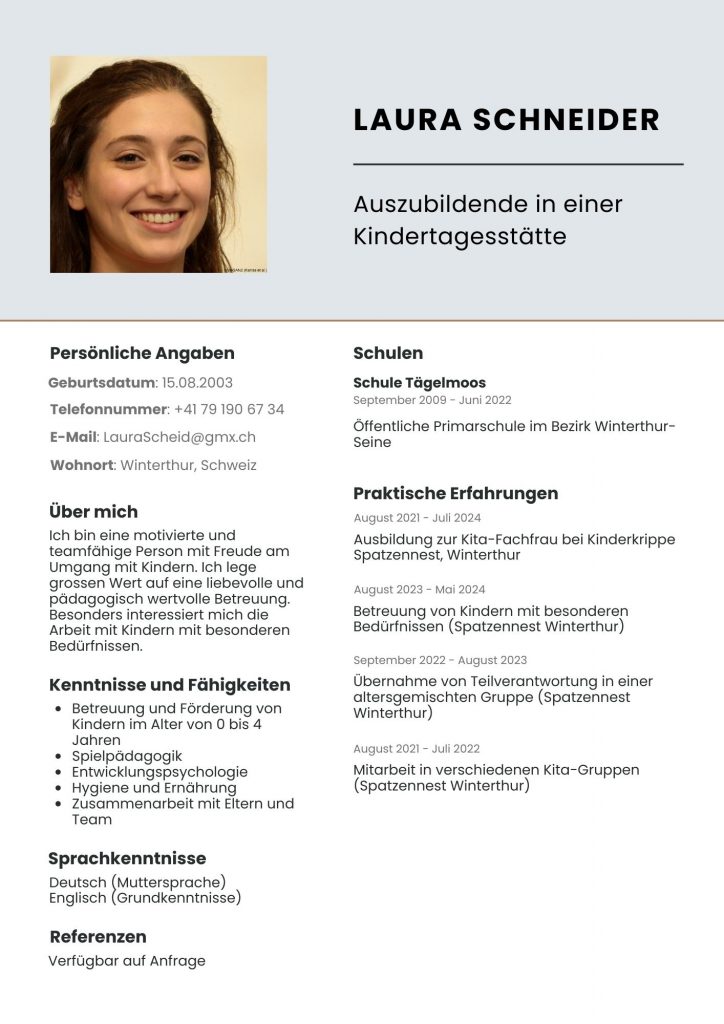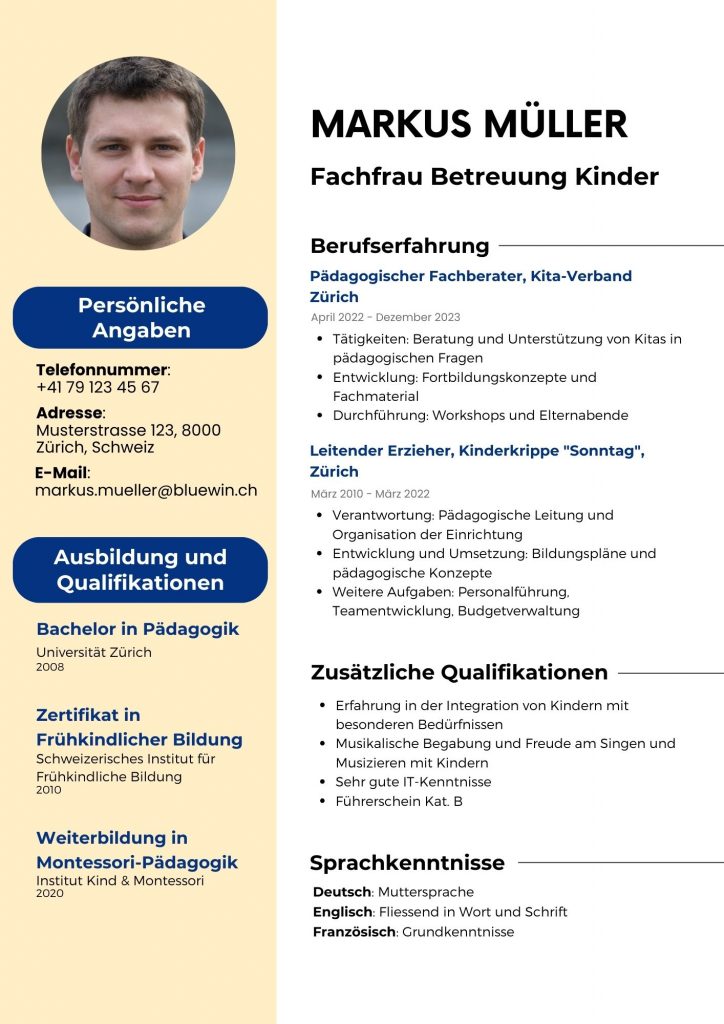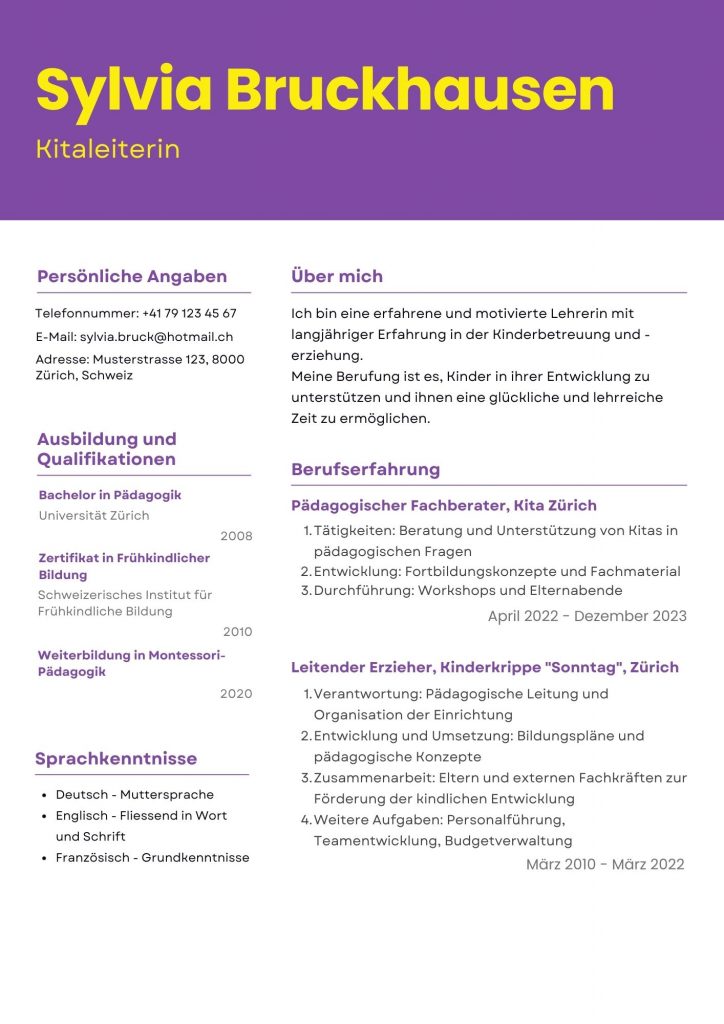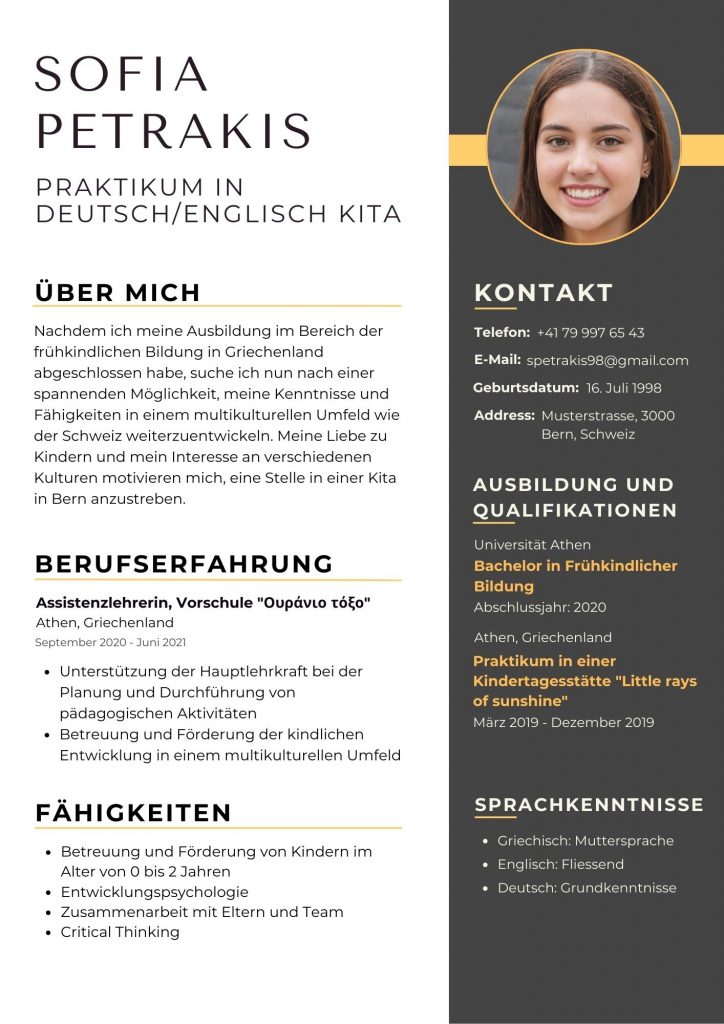Finding a new job in the childcare field is always stressful, especially for those who are afraid of financial strains. We understand your concerns, which is why we’d like to introduce you to opportunities for kindergarten and Kita jobs and help you prepare for interviews.
Whether you are planning to start your career in daycare or looking for a way to advance in this field, we have some useful job and internship application tips that can increase your chances of getting a job interview at Kita or kindergarten. In this article, we’ll share strategies for handling the recruiter’s trickiest questions and making a memorable impression during your self-presentation.
What Do You Need to Get a Job at Kita?
To become a teacher in Kita, it’s important to know what’s required of you. For professional positions, employers require proof of your qualifications. The Swiss Federal Vocational Certificate (EFZ) can officially confirm this, which can be obtained after completing a three to four-year apprenticeship [1].
To secure an internship in a Kita, you must meet certain requirements. A B2 level of German and complete secondary education is a must-have requirement. Some employers may also ask trainees to pass an additional language test (usually the Check S2Check S2 test is used for standardized assessment of knowledge and skills of secondary school students. Most of the tests are performed on a computer.) and an aptitude test (Multicheck test).
Kita and kindergarten employers highly value soft skills like empathy, responsibility, patience, and communication. However, even the strongest skill set can’t replace a genuine love for children. Working with young kids can be demanding at times, and if you don’t enjoy their company, this job will become overwhelming.

Source: Pexels
What to Include in the Application?
To get an invitation for an interview, you’ll need a well-prepared application package. There are many templates available to help you get creative with your resume, but remember to stay within professional boundaries. The more memorable your application is, the higher your chances of getting called in!
Here is a list of all the necessary documents:
- resume
- cover letter
- cover page + short application form (optional)
- motivational letter (optional)
- appendices: recommendations, certificates, etc.
First and foremost, pay attention to the tone of the job posting. We suggest aligning your papers with the posting’s style. This will demonstrate your attention to detail and that you’re a good fit with their company culture.
Municipal Kitas prefer a formal style, while private ones might welcome a more creative approach. We’ll discuss how to prepare the cover letter in the next section.
The cover page is meant to give a brief overview of you that highlights your qualifications for the position and usually takes up one page.
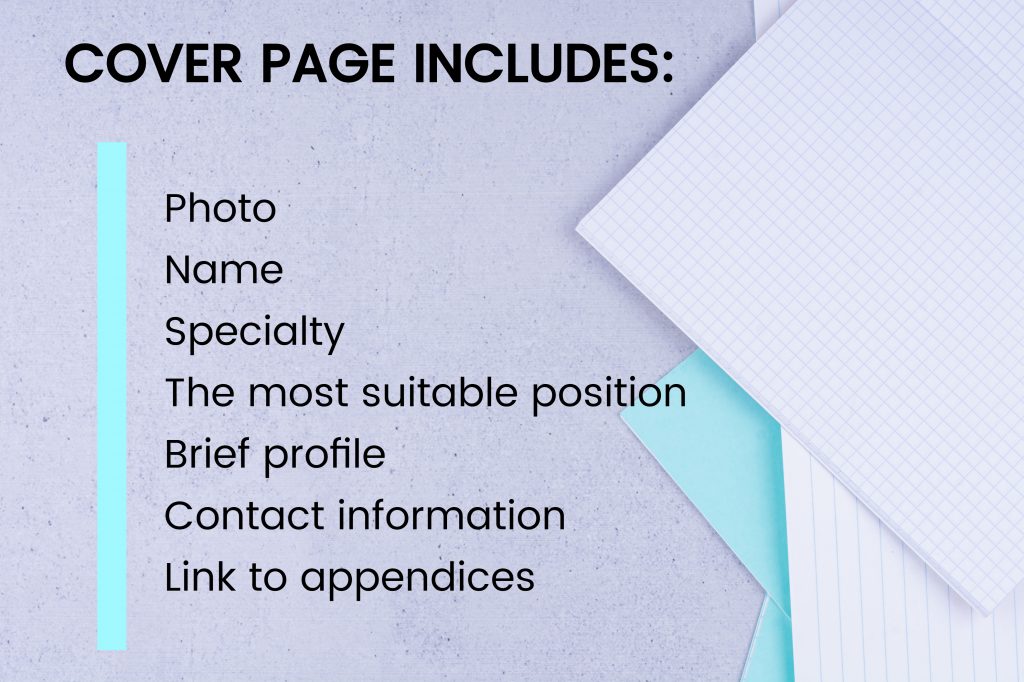
A structured resumeA resume is a document used to present one's background, skills, and accomplishments. A typical resume contains a brief description of work experience and education. is a great chance for you to showcase your qualifications and experience. To ensure a professional presentation, consider organizing it into several sections with clear headings. Here’s a suggested structure for you:
- personal information
- professional skills (optional)
- work experience
- education (schooling, school, and professional training)
- other practical experience (internships, voluntary social year, student work experience, etc., if available and relevant)
- seminars, training, and courses
- other skills and knowledge
Employers prefer resumes in reverse chronological order, starting with the most recent position. We suggest including not only years, company names, and job titles, but also list responsibilities and accomplishments to emphasize your experience. However, positions or courses that are older than ten years may not be relevant to the job you are applying for and can be omitted.
Keep in mind that employers often use special programs to sort resumes, so it is important to clearly state your qualifications. For example, we recommend using “professional qualification” to denote a nationally recognized teacher and a “degree” for school and university diplomas.
If you are applying for an internship, it is recommended to prioritize the education section in your resume, as it holds the most weight.

Source: Pexels
Cover Letter for Kindergarten Teacher
The cover letter can rightly be called the cornerstone of your application. A strong opening can be the deciding factor for the first impression that determines whether the employer will delve further into your materials. That’s why it’s crucial to showcase your personality and qualities that align with the job requirements.
To write a compelling cover letter, focus on highlighting your personality and how it aligns with the job’s requirements. Emphasize your professional experience, results, and achievements. You can also talk about your skills and share your motivation, but avoid mentioning weaknesses.
Use your previous roles to showcase your soft skills as well. This will prove that you’re an excellent candidate for the job. However, remember that the emphasis should primarily be on hard skills and past achievements.
Internship positions also require a cover letter. But unlike experienced professionals, you should focus on your motivation. Show your passion for working with children, and make it clear that this isn’t just a mandatory task. Were you a natural with younger siblings or a reliable babysitter? These experiences demonstrate your genuine interest in childcare.
End your cover letter with an impressive closing paragraph to express your eagerness for an interview and your interest in joining this particular Kita or kindergarten. Be sure to mention your earliest available start date and, if requested, your expected salary. This will show your commitment to joining the Kita and help you stand out from other candidates.
How to Prepare for a Job Interview as a Kita Teacher?
By following our tips, you should get an invitation for an interview in no time. And if you did, congratulations! Now you have one more important step in getting a new job, which is preparing for the job interview and tricky questions from the recruiter.
Before the interview, take some time to research your potential future workplace. Learn about their values, culture, and work environment. Those insights will greatly benefit you throughout the interview process and significantly enhance your chances of success.
During the interview, present yourself with confidence and try to speak clearly. Pay attention to your posture, and body language, and don’t forget the smile. Listen carefully to the interviewer and don’t hesitate to ask clarifying questions to show interest. This way, you can show your positive qualities without even having to mention them.
Feeling nervous before an interview is perfectly normal — even interviewers experience this! With a well-rested mind and support from close friends and relatives, you will be able to ace the interview.

Source: Pexels
Self-Presentation
Your interview begins, and the recruiter asks, “Please tell us about yourself.” If you were not expecting this question, it can cause a lot of anxiety, but it’s nothing to be afraid of. With a bit of preparation, you’ll easily get through this stage.
Below you will see a few strong self-presentation questions from us that you can reflect on:
- What motivates me to be an educator?
- Why am I interested in this Kita?
- What tasks excite me the most? (Especially if the job description isn’t clear)
- What strengths, both professional and personal, make me a great fit for this role?
- Which of my past accomplishments can demonstrate my skills?
- Where do I see myself growing in this role?
It would be helpful to practice a bit so you feel more confident.
Sooner or later, the recruiter will ask you about your weaknesses, so it will be helpful to take stock of your areas for improvement beforehand. Kita’s managers value candidates with skills in three key areas: communication, creativity, and childcare. Let’s break these down into two categories: hard skills and soft skills.
Hard skills are the specific, measurable skills that you have acquired through education, training, or any experience in general. For example, a kindergarten teacher should practice skills like:
- Pedagogical knowledge: you must know the basics of nurturing and developing children.
- First aid: you must be able to act quickly and effectively in emergencies.
- Creativity: in the childcare field, creativity is always a hard skill. It includes the ability to come up with innovative solutions, customize activities to meet children’s individual needs, and design engaging learning materials.
Soft skills are the personal qualities that set you apart when working with children and communicating with colleagues and parents. Here are some examples:
- patience
- communication skills
- empathy
- ability to motivate
- sense of responsibility
- flexibility
- ability to resolve conflict
- resilience
You don’t have to master all these skills perfectly right away, the most important thing is a willingness to learn and grow.
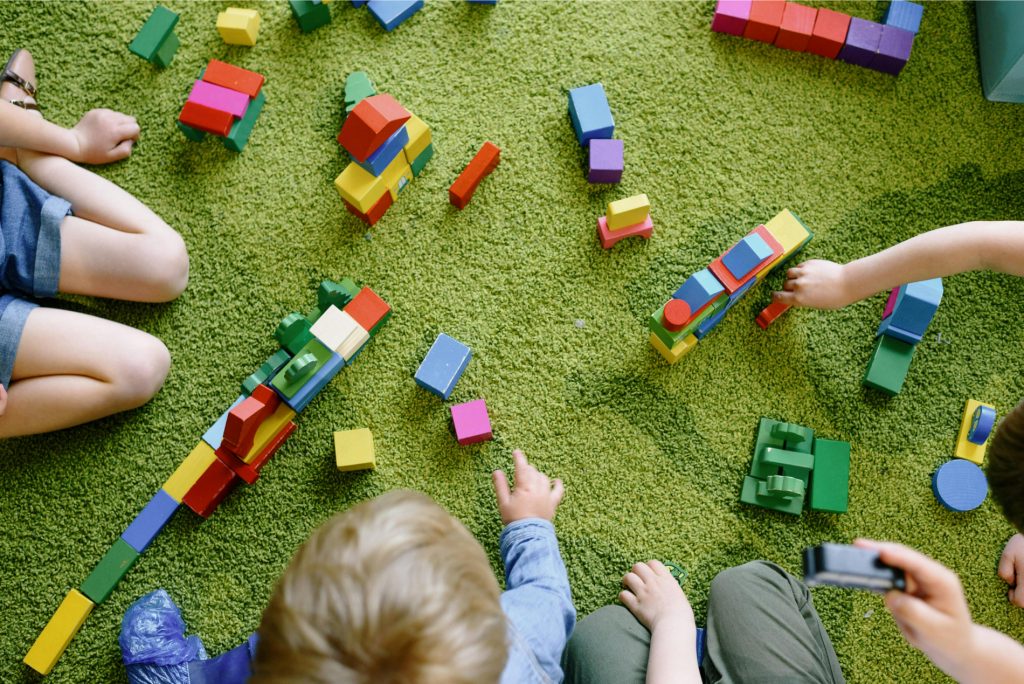
Source: Pexels
Job-Specific Questions
To succeed at this stage, you need to be confident in self-presentation and prepared for any challenge. To show the recruiter that you are a perfect fit for their culture, we recommend researching information about Kita or kindergarten in advance to learn about their approach to teaching children. This will help you choose the best answers and make a good impression.
During the interview, you can expect to be questioned about your skills and weaknesses. It’s important to be honest and transparent, but also to focus on how you work towards improvement. Perfection is not the goal, and managers understand that.
The interviewer may also ask you how you would handle difficult situations related to your responsibilities. Here are examples of questions to help you prepare:
- How would you handle a situation where a parent expresses concern that their child is falling behind in the group?
- How would you respond to a child who shows aggressive behavior and breaks toys?
To give the best response, emphasize a calm and supportive approach, demonstrating your commitment to assisting both children and parents. It’s important to refer to your experiences where you effectively addressed similar challenges. This will help showcase your ability to handle difficult situations and your dedication to your responsibilities.
Salary Negotiations
Discussing salary expectations can be challenging, but it’s not as bad as it seems. Take a look at the average salary for a kindergarten and Kita specialist position, which typically is about 58,000 francs yearly, according to Kununu, but it can vary based on your experience and responsibilities.
We advise you to stand your ground and avoid accepting the lowest rate right away. Instead, propose a salary slightly higher than you expect if you feel the interview went well, but remain open to negotiation. This will not only show your worth but also contribute to market growth.
Questions to the Recruiter
At this final stage, your awareness of the position’s responsibilities and kindergarten’s or Kita’s teaching approach will be key to understanding if this is your dream role. To ensure that you make the right decision and accept a role that aligns with your interests and values, we suggest preparing 2–3 thoughtful questions.
Showcasing your genuine interest and motivation in the Kita will make you a more appealing candidate to the employer, and asking the right questions will help you make an informed decision.

Source: Pexels
Why Is Self-Presentation Important in a Job Interview?
Childcare specialists believe that excellent communication skills are key to being successful in dealing with children, parents, and other staff members. Your ability to present yourself professionally is an excellent way to showcase your skills and demonstrate commitment to the position.
It’s important to note that the way you present yourself during an interview can make a lasting impression on the recruiter. A positive first impression can greatly impact how your interview is perceived and set you apart from other candidates.
We believe that effective self-presentation is a reflection of your ability to communicate clearly and confidently. This is particularly important in the Kita and kindergarten environment, where you may need to make quick decisions and handle unexpected situations.
This is why employers want to hire individuals who can represent their organization positively, especially when it comes to children and parents. By demonstrating these qualities during the interview, you’ll be giving yourself the best chance to succeed!
Summary
The application and interview process at Kita or kindergarten is not too different from other roles. With proper preparation and attention to detail in your application package, you can easily get a job or internship at any Kita.
While preparing for a job interview in a Kita, it’s crucial to analyze your strengths and weaknesses and practice answering typical questions. By doing so, you’ll feel more confident and ready to impress your interviewer. Ensure you get a good night’s sleep before the interview and believe in your ability to succeed. We hope this article will help you feel confident in pursuing the job you want.
FAQ
🤔 What Questions Do Kitas Ask in a Job Interview?
The recruiter will ask you questions that are specific to the position, such as your experience, ability to create a safe, inclusive environment for children, and communication skills. You can also expect typical questions that are common in every interview.
📝 What Is the Best Way to Prepare for the Interview?
Before your interview, we suggest researching Kita’s values and educational program. Practice discussing your experience with children and answering common questions. Also, prepare a couple of thoughtful questions for the interviewer.
💪 What Are My Strengths as a Kita Teacher?
As a Kita teacher, your strengths may include patience, creativity, strong communication skills, and a genuine passion for working with young children.
👩🏫 What Qualities Are Important for a childcare provider at a Kita?
Important qualities for a childcare provider include communication skills, patience, adaptability, attentiveness, and the ability to create a safe and caring environment for children.
References
- Csfo, S. |. (n.d.-b). Eidgenössisches Fähigkeitszeugnis EFZ. SDBB | CSFO. https://www.berufsberatung.ch/dyn/show/1922

